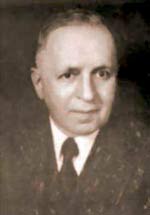- Faik Konica
Infobox Person
name = Faik Konitza

image_size = 150
caption =
birth_date = birth date|1875|3|15
birth_place =
death_date = death date and age|1942|12|15|1875|3|15
death_place =
other_names =
known_for =
occupation =Faik Konitza ( _sq. Faik Konica, March 15, 1875 – December 15, 1942), was one of the greatest figures of
Albania n culture in the early decades of the twentieth century. Prewar Albanian minister toWashington , his literary review, "Albania", became the focal publication of Albanian writers living abroad. Faik Konitza wrote little in the way of literature, but as astylist ,critic ,publicist andpolitical figure he had a tremendous impact on Albanian writing and onAlbanian culture at the time.Biography
Konitza was born on 15 March 1875 in the now village of Konitsa in the
Pindus mountains in northernGreece , not far from the present Albanian border. After elementary schooling in Turkish in his native village, he studied at the Jesuit Saverian College inShkodra which offered him not only some instruction in Albanian but also an initial contact with centralEuropean culture and Western ideas. From there, he continued his schooling at the eminent French-language Imperial Galata secondary school (Galatasaray Lisesi ) inConstantinople .In 1890, at the age of fifteen, he was sent to study in
France where he spent the next seven years. After initial education at secondary schools inLisieux (1890) andCarcassonne (1892), he registered at the University ofDijon , from which he graduated in 1895 inRomance languages andphilology . After graduation, he moved toParis for two years where he studiedMedieval French literature ,Latin and Greek at the famousCollège de France . He finished his studies at prestigiousHarvard University in theUnited States , although little is known of this period of his life. As a result of his highly varied educational background, he was able to speak and write Albanian,Greek, Italian, French, German, English and Turkish fluently.Konitza strove for a more refined
Western culture inAlbania , but he also valued his country'straditions . He was, for instance, one of the first topropagate the idea of editing the texts of olderAlbanian literature . In an article entitled "Për themelimin e një gjuhës letrarishte shqip", (On the foundation of an Albanian literary language), published in the first issue of "Albania", Konitza also pointed to the necessity of creating a unifiedliterary language . He suggested the most obvious solution, that the two maindialects ,Tosk andGheg , should be fused andblend ed gradually. His ownfluid style was highly influential in therefinement of southern Albanian Toskprose writing, which decades later was to form the basis of the modern Albanian literary language (standard language ).In 1903-1904, Faik Konitza was resident at Oakley Crescent in
Islington ,London . There he continued to edit and publish, under the pseudonym "Thrank Spirobeg", the dual language (French/Albanian) periodical "Albania" that he had founded inBrussels in 1897. He contributed bitingly sarcastic articles on what he saw as the cultural backwardness and naivety of his compatriots."Albania" helped to spread
awareness of Albanian culture and the Albaniancause acrossEurope , and was highly influential in the development and refinement of Southern Albanian prose writing. In the words of the famous French poetGuillaume Apollinaire , "Konitza turned a rough idiom of sailors inns into a beautiful, rich and supple language"".
Whilst in Brussels, Konitza had acorrespondence with Apollinaire regarding an article published by the poet in L'Europen. When Apollinaire came to London seeking to regain the affections of Annie Pleyden, an Englishgoverness he had met and fallen in love with inGermany , he stayed with Konitza at Oakley Crescent.Apollinaire published a
memoir of Konitza in the Mercure de France on 1 May 1912, which begins: ""Of the people I have met and whom I remember with the greatest pleasure, Faik Bey Konitza is one of the most unusual". He recalls: "We would have lunch the Albanian way, which is to say, endlessly. The lunches were so long that I could not visit a single museum in London, as we would always arrive when the doors closed, and the attention and care with which Konitza edited his articles meant that the journal always came out very late. In 1904, only the issues for 1902 appeared; in 1907, the issues for 1904 came out at regular intervals. The French journal L'Occident is the only one that could compete with 'Albania' in that respect".He died in
Washington on 15 December 1942 and was buried inForest Hills Cemetery inBoston . After the fall of theCommunist regime dictatorship inAlbania , his remains were transferred toTirana and interred in a park at the edge of the city.External links
* [http://www.elsie.de/pdf/articles/A2000IntroKonitza.pdf Robert Elsie's introduction to Faik Konitza ("pdf")]
* [http://www.albanianstudies.org/Konitza.html "Faïk Konitza - Selected Correspondence 1896-1942"]
* [http://www.starova.com.mk/08konica/book.html Luan Starova: "Faik Konitza and Guillaume Apollinaire"]
* cite news
author=
title=Sister Act
date=1938-03-28
work=Time Magazine
url=http://www.time.com/time/magazine/article/0,9171,759392,00.html
accessdate=2008-08-10
* [http://www.shtepiaelibrit.com/libri/advanced_search_result.php?keywords=faik+konica&osCsid=e4a0d9ce425ac843d3c405378b04d4e8&x=0&y=0 Faik Konica, Vepra 1, 2, 3 dhe 4 te www.ShtepiaeLibrit.com]
Wikimedia Foundation. 2010.
